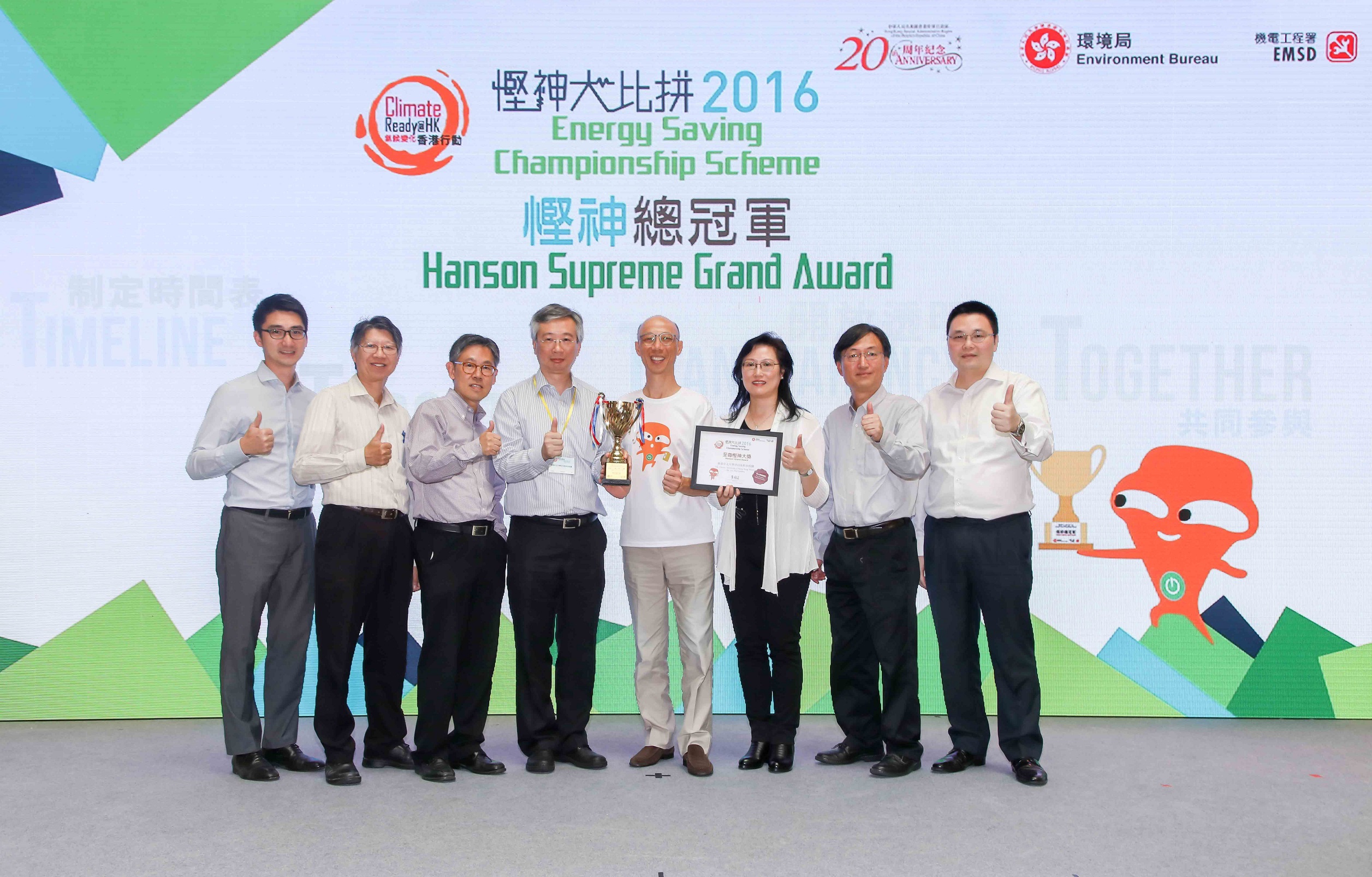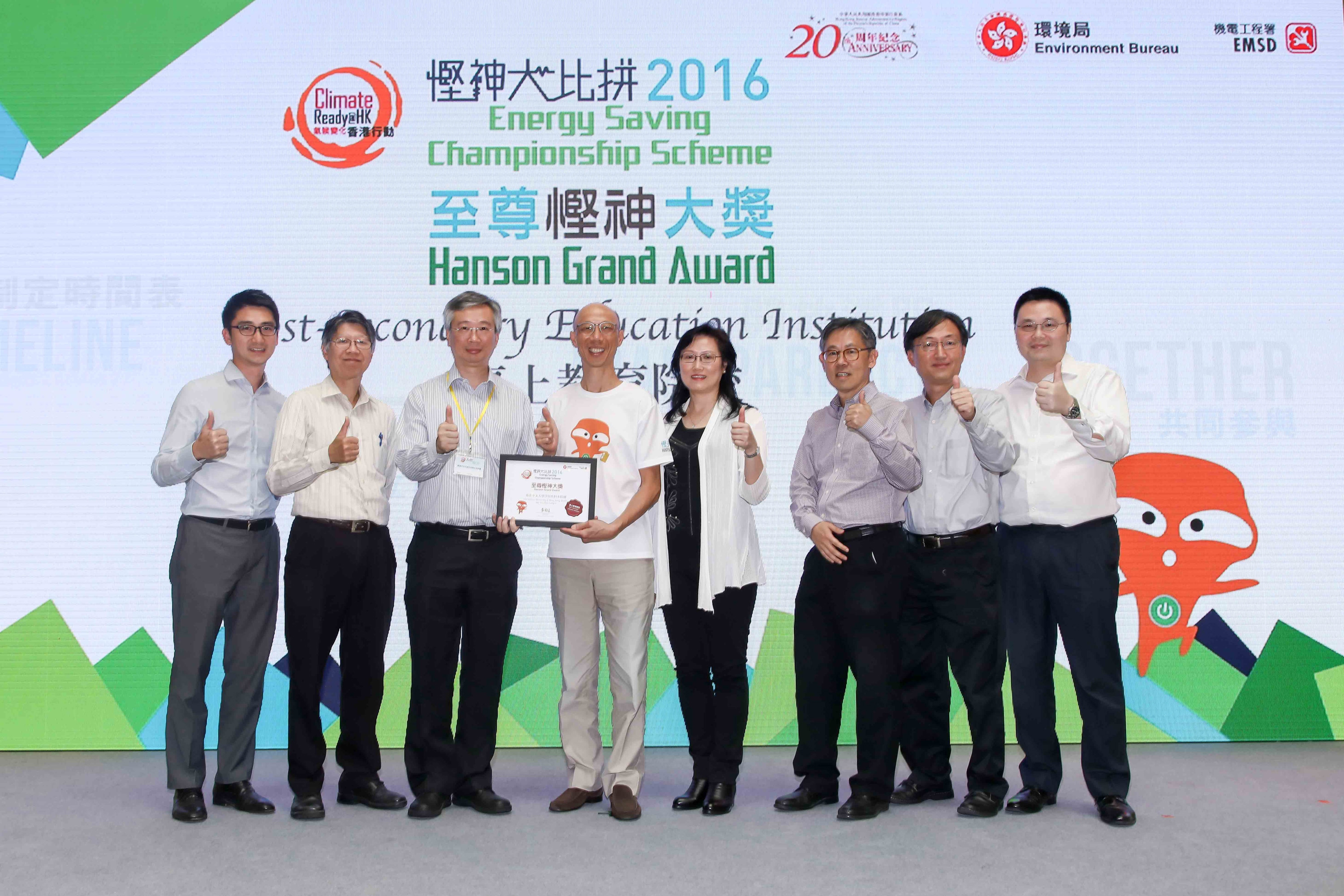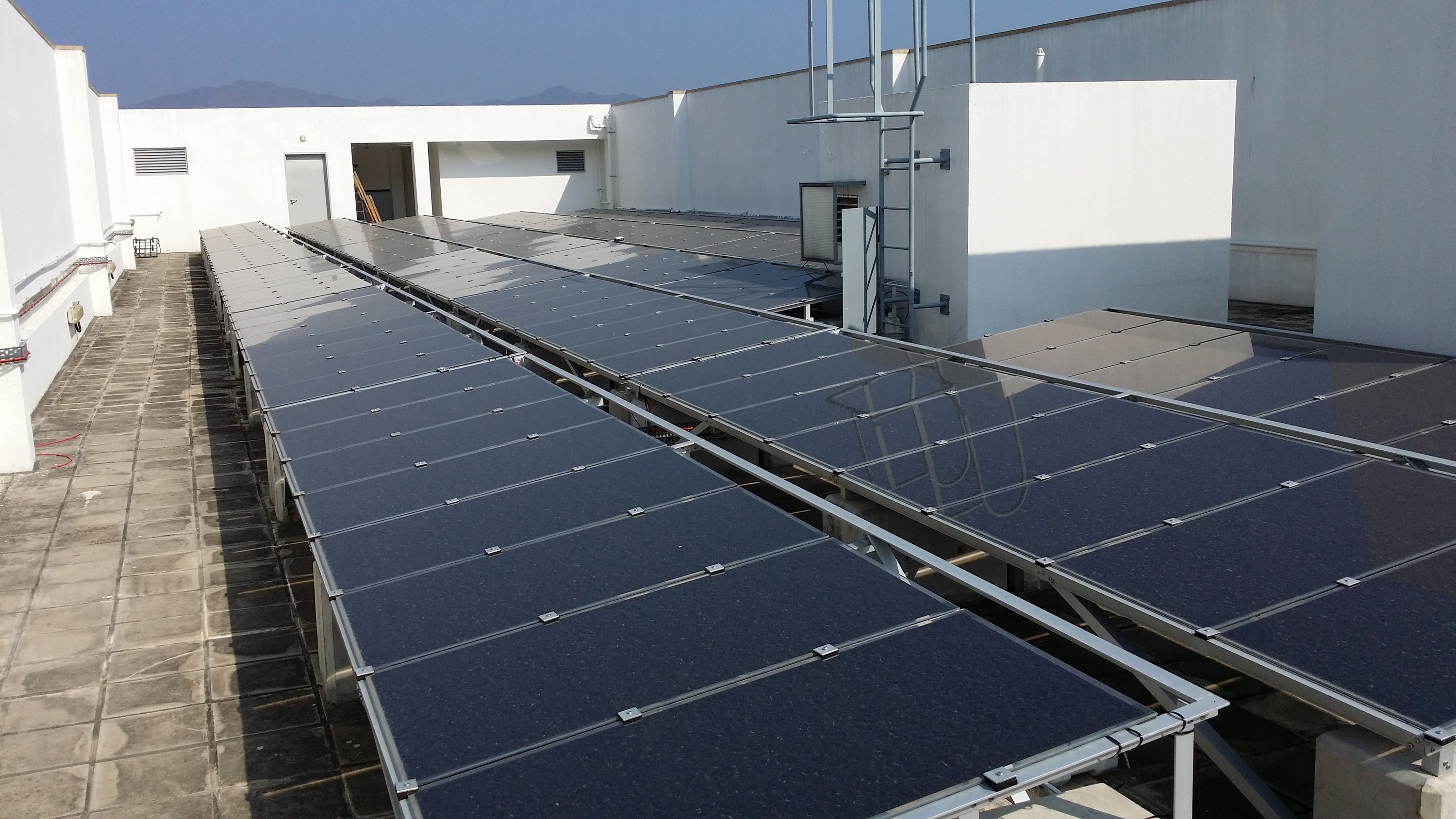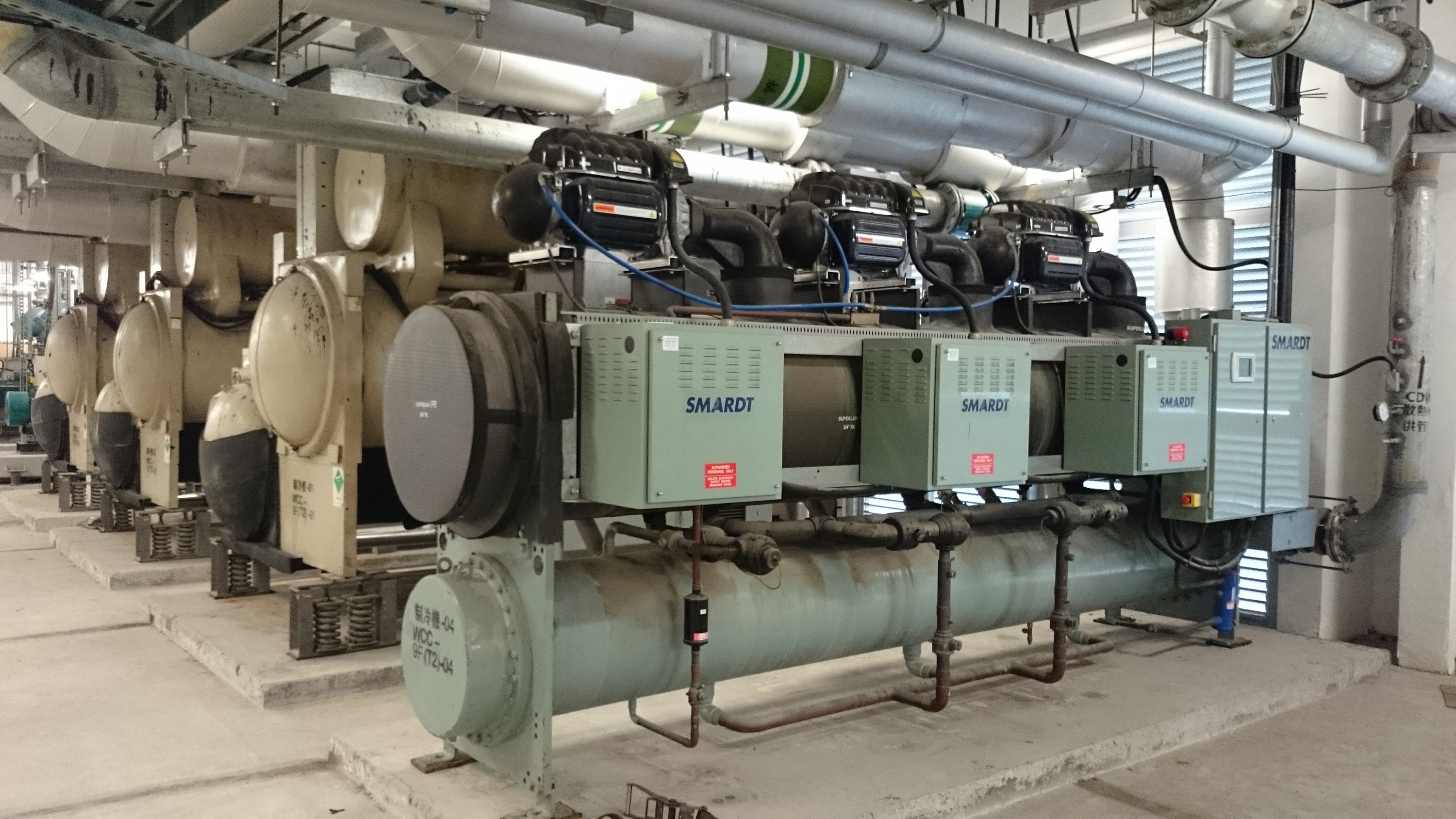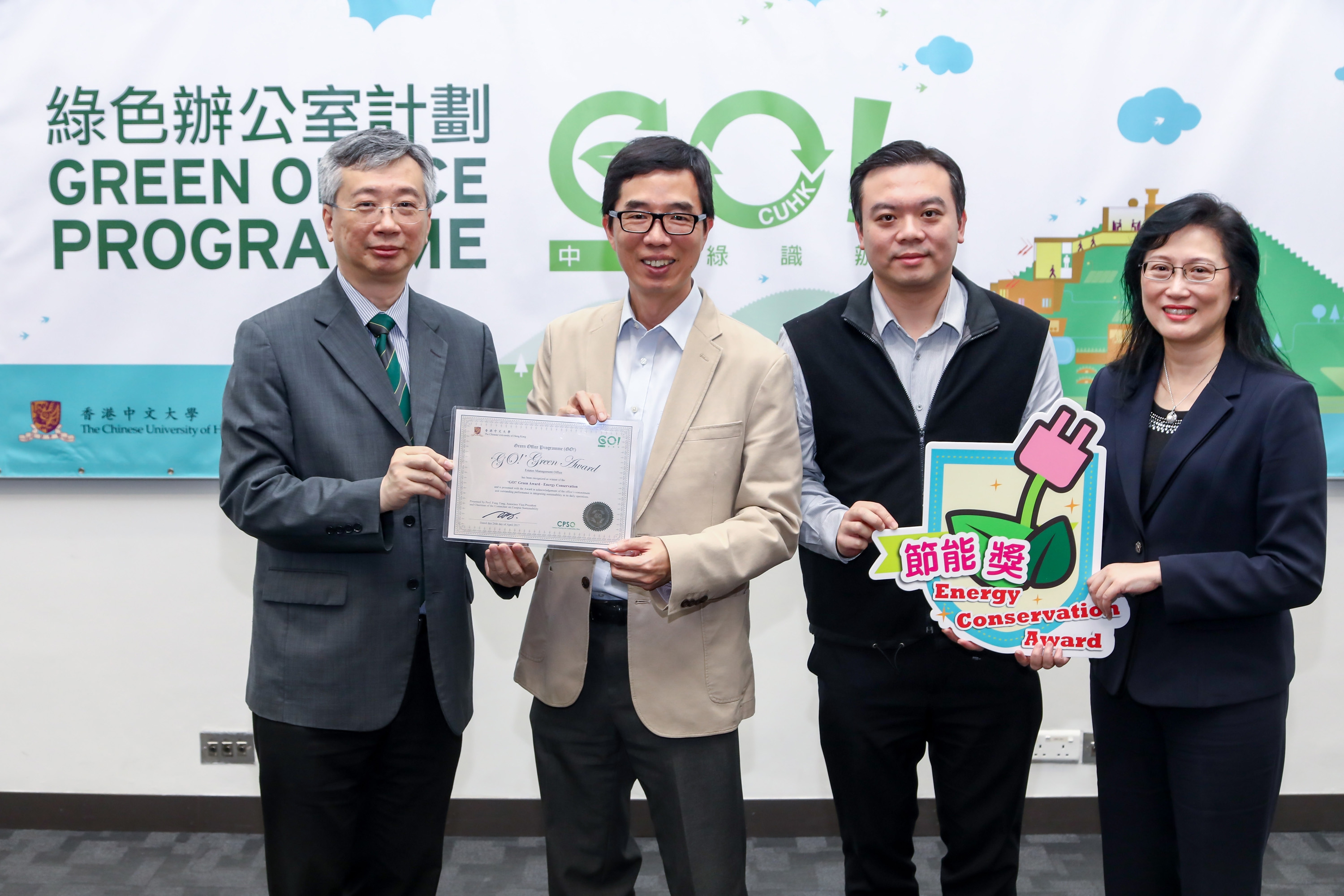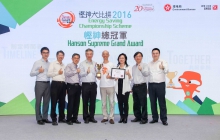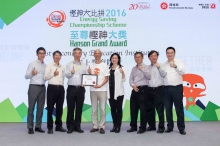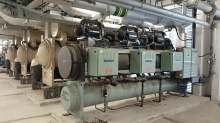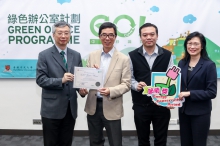CUHK
News Centre
CUHK Sweeps the Board in Inaugural ‘Energy Saving Championship Scheme’Effective Energy Conservation Measures Save $30M Electricity Expenses
The Chinese University of Hong Kong (CUHK) triumphed in the inaugural ‘Energy Saving Championship Scheme 2016’ organized by the Environment Bureau and Electrical and Mechanical Services Department by scooping up three awards: the ‘Hanson Supreme Grand Award’ (overall champion among all 270 participating organizations), the ‘Hanson Grand Award’ (top award in the post-secondary education institution category) and the cross-category ‘Most Innovative Energy Saving Measures Award’. The accolades testify to the University’s outstanding achievements in energy conservation and leadership in sustainable development. Prof. Fung Tung, Associate Vice-President and Chairman of the Committee on Campus Sustainability received the awards at the award ceremony today (18 May) on behalf of CUHK.
Prof. Joseph J. Y. Sung, Vice-Chancellor and President of CUHK, feels proud of the achievements, ‘CUHK spares no effort in implementing energy saving policies, adopting new technologies, and engaging students and staff in energy conservation and significant progress has been made. Over the past 3 years, our electricity consumption has been continuously dropping. Total electricity consumption in 2015-16 was reduced by 9.9% as compared to the base year figure in 2012-13, which means over 90 million MJ energy was saved, which is equivalent to an electricity charge of around HK$30 million. The awards represent a great recognition of the University’s long-term efforts in promoting sustainable development.’
Use of Innovative Energy Saving Technologies Proves Effective
As early as 2010, CUHK pledged in its Campus Master Plan to reduce electricity consumption (per capita) by 25% by 2025 (with 2005 as the base year). In 2012, a 5-year mid-term target was set to reduce electricity consumption (per capita) by 8% by 2017. Prof. Fung Tung remarked, ‘We fulfilled our mid-term target ahead of time in 2015, thanks to the efforts of the Campus Development Office and Estates Management Office in attempting various innovative energy saving technologies on campus which has become a “living laboratory”.’
Since 2012, the University has put in many additional resources to reduce energy consumption in campus buildings. Currently, 13 new buildings on campus have received ‘Platinum’ or ‘Gold’ BEAM (Building Environmental Assessment Method) or BEAM Plus ratings for their environmental-friendly designs. The University has also carried out major refurbishment of campus buildings over the past years by replacing the air-cooled chillers with energy-saving water-cooled chiller systems, and progressively switching to more energy-efficient oil-free chillers. The University is now working on installing district cooling air- conditioning systems for suitable building clusters, as well as adopting solar water heaters and photovoltaic panels more extensively in student hostels and buildings.
Successful Engagement of the Campus Community in Environmental Protection
Ms. Vivian Ho, Director of Campus Planning and Sustainability, said, ‘Our strategy is to mobilize over 30,000 students and staff members to participate in various energy conservation programmes. The “Energy Saving Championship Scheme” has offered a great opportunity for us to exchange ideas and experience with other participating organizations. We look forward to encouraging more people to join the campaign, to gather our efforts in reducing energy consumption and carbon emissions, and help promote green culture and an eco-friendly lifestyle.’
The University requires each office to appoint at least one staff member as the ‘Energy Warden’ to identify energy conservation measures for their own office. Statistics of energy consumption are also shared with all offices/units regularly so that they are aware of their progress and achievements. In 2014, CUHK rolled out the ‘Energy Conservation Incentive Scheme’, the first programme of its kind in the local post-secondary education sector, to set energy conservation targets for over 100 academic and administrative units. Most of the participating units succeeded in meeting the targets, with the best performer saving over 20% of energy consumption.
CUHK actively organizes various programmes and competitions to encourage students and staff to change their energy use habits, raise awareness on energy conservation, and promote sustainable low-carbon lifestyle and office practices. These activities include the ‘Green Office Programme (GO!)’, ‘Green Student Society Scheme (SO Green!)’, ‘Green O’Camp Sponsorship’, ‘Greenest O’Camp Award’ and the ‘CU Green Buddies Scheme’. Various colleges also organize energy saving competitions in their student hostels on a regular basis.
About the ‘Energy Saving Championship Scheme’
The ‘Energy Saving Championship Scheme’, launched in 2016 by the Environment Bureau and Electrical and Mechanical Services Department, aims to engage different sectors in Hong Kong to take actions which support the ‘Energy Saving Plan for Hong Kong’s Built Environment 2015~2025+’. These actions include encouraging different sectors to set energy saving targets comparable to or even exceeding that of the Government’s, promoting green building design and management, acknowledging organizations that adopt effective energy saving technologies and best practices, and actively promoting energy conservation among users. The Scheme has five categories, each with five grades of awards. The highest honour, the Hanson Grand Award, is awarded to the organization with the best performance within the category. Over 270 organizations vied for the awards in the 2016 Scheme. The winning organizations needed to fulfill the following criteria:
- Continuous achievement in energy saving over the past 3 years;
- Adoption of creative, innovative and practical energy saving technologies and practices that can be modelled by other organizations in the same sector;
- Effective engagement of users including occupants, tenants, staff, students and community in energy saving measures and behavioural change, and
- Setting a long-term energy saving target with implementation plan to achieve the target.
CUHK receives the ‘Hanson Supreme Grand Award’. (From left) Mr. Tom Chong, Energy Manager of Estates Management Office; Mr. Andrew Fong, Acting Director of Estates Management; Mr. Fung Siu Man, Director of Campus Development; Prof. Fung Tung, Associate Vice-President and Chairman of the Committee on Campus Sustainability; Mr. Wong Kam Sing, Secretary for the Environment, HKSAR Government; Ms. Vivian Ho, Director of Campus Planning and Sustainability; Mr. Li Sing Cheung, Senior Engineer of Campus Development Office and Mr. Kalvin Lai, Assistant Director (Sustainability) of Campus Planning and Sustainability Office.
CUHK receives the ‘Hanson Grand Award’. (From left) Mr. Tom Chong, Energy Manager of Estates Management Office; Mr. Andrew Fong, Acting Director of Estates Management; Prof. Fung Tung, Associate Vice-President and Chairman of the Committee on Campus Sustainability; Mr. Wong Kam Sing, Secretary for the Environment, HKSAR Government; Ms. Vivian Ho, Director of Campus Planning and Sustainability; Mr. Fung Siu Man, Director of Campus Development; Mr. Li Sing Cheung, Senior Engineer of Campus Development Office and Mr. Kalvin Lai, Assistant Director (Sustainability) of Campus Planning and Sustainability Office.


